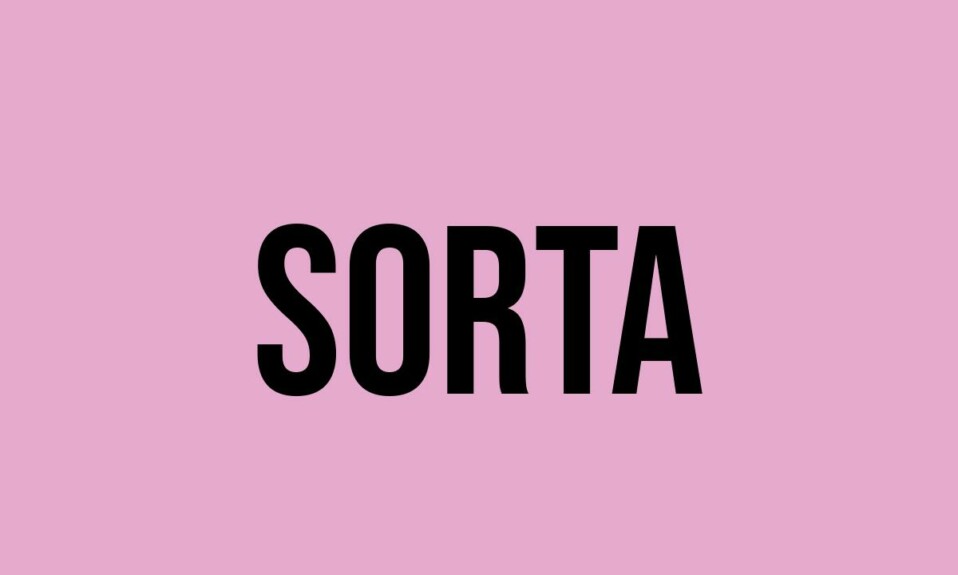What Does Sorta Mean?
The term sorta is an abbreviation of “sort of,” which is commonly used to indicate that something or someone is similar to something else but not exactly the same. It is frequently used in casual conversations and online communication. The term sorta originated from the phrase “sort of,” which has been used in the English language for a long time. The abbreviation sorta allows for a quicker way to say “sort of,” with the “f” sound being cut off. It is similar to the abbreviation kinda, which is short for “kind of.”
People use sorta to convey that something or someone is comparable to another thing or person, but with some differences or limitations. For example, you might say that a movie sequel is sorta like its predecessor, or that a pizza roll tastes sorta like an actual slice of pizza. Here are some examples of how to use sorta in conversation:
- “I’m not really a fan of horror movies, but I sorta like psychological thrillers.”
- “The new restaurant in town is sorta like a fusion of Italian and Mexican cuisine.”
- “I’m not sure if I want to go to the party tonight. I’m feeling sorta tired.”
- “The weather forecast says it will be sorta sunny with a chance of rain later.”
- “I tried the new vegan burger, and it was sorta tasty, but I prefer the regular one.”
It’s important to note that sorta does not have a sexual connotation. It is simply a casual way to express that something or someone is similar to another thing or person, but not exactly the same. It is not a typo or typing mistake, but rather an intentional abbreviation used in informal communication.



What Does Sorta Mean From a Girl?
When a girl uses the term sorta, it generally means the same thing as when anyone else uses it. It is an abbreviation of “sort of” and is used to indicate that something or someone is similar to something else but not exactly the same. Girls use sorta in conversations and online communication just like everyone else.
Here are some key points to consider:
- Specific meaning from a girl: Girls use sorta to convey that something or someone is comparable to another thing or person, but with some differences or limitations. For example, a girl might say “I’m sorta tired” to indicate that she is feeling somewhat tired but not completely exhausted.
- How girls use it: Girls use sorta in casual conversations and online communication, just like guys. It is a common slang term that is used to express similarity with some variation.
- How to reply: If a girl uses sorta in a conversation with you, you can respond by acknowledging her statement and providing your own thoughts or feelings on the matter. For example, if she says “I’m sorta tired,” you could reply with “Yeah, I know what you mean. I’m feeling a bit drained too.”
It’s important to note that girls do not use sorta differently compared to everyone else. The meaning and usage of the term are the same regardless of gender. So, if a girl uses sorta in a conversation with you, there’s no need to overthink it or assume there’s a hidden meaning. Just take it at face value and respond accordingly.
Example 1:
- Girl: Are you coming to the party tonight?
- Guy: I’m sorta tired, but I’ll try to make it.
Example 2:
- Girl: How was your day?
- Guy: It was sorta boring. Nothing exciting happened.
Example 3:
- Girl: Did you like the movie?
- Guy: Yeah, it was sorta good. The ending was a bit disappointing though.
Example 4:
- Girl: Are you free this weekend?
- Guy: I’m sorta busy, but I might be able to squeeze in some time.
Example 5:
- Girl: Do you want to grab dinner later?
- Guy: I’m sorta hungry, so that sounds like a plan.
What Does Sorta Mean From a Guy?
When a guy uses the term sorta, it could imply different things. It could signify a similar meaning as when anyone else uses it, indicating that something or someone is comparable to another thing or person but not exactly the same. However, from a guy’s perspective, it might also have additional connotations or intentions.
Here are some possible reasons why a guy might use “sorta” in conversation:
- He is expressing uncertainty or hesitation: A guy might use “sorta” to convey that he is unsure about something or has mixed feelings about it. For example, he might say “I’m sorta interested in going to the party” to indicate that he is not fully committed or enthusiastic about attending.
- He is downplaying his emotions: In some cases, a guy might use “sorta” as a way to downplay his emotions or feelings. For instance, he might say “I sorta like you” to indicate that he has some level of attraction or interest but doesn’t want to come on too strong.
- He is being noncommittal: Using “sorta” can also be a way for a guy to avoid making definitive statements or commitments. For example, he might say “I’m sorta free this weekend” to indicate that he has some availability but doesn’t want to make concrete plans.
It’s important to note that the specific meaning of “sorta” from a guy will depend on the context and his individual communication style. Some guys may use it casually and interchangeably with other slang terms, while others may use it more intentionally to convey specific nuances.
If a guy says “sorta” to you and you’re trying to figure out what he meant, here are a couple of things to consider:
- Consider the context of the conversation. Did he use “sorta” in response to something you said or did? Was it used casually or with more intention?
- Think about the relationship you have with this guy. Are you friends, dating, or in a relationship? Does his use of “sorta” align with how he typically communicates with you?
- Pay attention to his body language and tone of voice. Does he seem genuine, hesitant, or playful when using “sorta”?
Of course, it is entirely possible that a guy is using “sorta” casually without any specific meaning behind it. In that case, it’s best to take it at face value and respond accordingly.
Example 1:
- Guy 1: Hey, did you see that new action movie?
- Guy 2: Yeah, it was sorta like a mix of James Bond and Mission Impossible.
Example 2:
- Guy 1: Have you tried the new burger joint in town?
- Guy 2: Yeah, their burgers are sorta like In-N-Out but with a twist.
Example 3:
- Guy 1: I’m thinking of getting a new car.
- Guy 2: Cool, what kind are you looking at?
- Guy 1: I’m sorta interested in a hybrid SUV.
Example 4:
- Guy 1: Did you watch the game last night?
- Guy 2: Yeah, it was sorta intense. The score kept going back and forth.
Example 5:
- Guy: I’m planning a trip to Europe next year.
- Girl: That sounds amazing! Where are you thinking of going?
- Guy: I’m sorta considering Italy and France, but I haven’t decided yet.
Origin of Sorta
The term “sorta” is an abbreviation of “sort of,” which is commonly used to indicate that something or someone is similar to something else but not exactly the same. It originated from the phrase “sort of,” which has been used in the English language for a long time. The abbreviation “sorta” allows for a quicker way to say “sort of,” with the “f” sound being cut off. It is similar to the abbreviation “kinda,” which is short for “kind of.” People use “sorta” to convey that something or someone is comparable to another thing or person, but with some differences or limitations. The origins of the word are not clear, but it is likely a natural evolution of the phrase “sort of” in casual speech and writing.
Frequently Asked Questions
Slangs similar to Sorta
The terms kinda, somewhat, moderately, fairly, and slightly are similar to sorta because they all describe something or someone that is similar to another thing or person to some extent, but not exactly the same. These words are used to convey a level of similarity or comparison with certain differences or limitations.
Is Sorta A Bad Word?
No, “sorta” is not a bad word or vulgar word. It is an abbreviation of “sort of,” commonly used to say that something or someone is like something else but not exactly the same. It is often used in casual conversation, both in person and online.
Is Sorta a Typo or Misspelling?
No, “sorta” is not a misspelling or a typo. It is an abbreviation of “sort of” and is commonly used in casual conversations and online communication to indicate that something or someone is similar to something else but not exactly the same.





